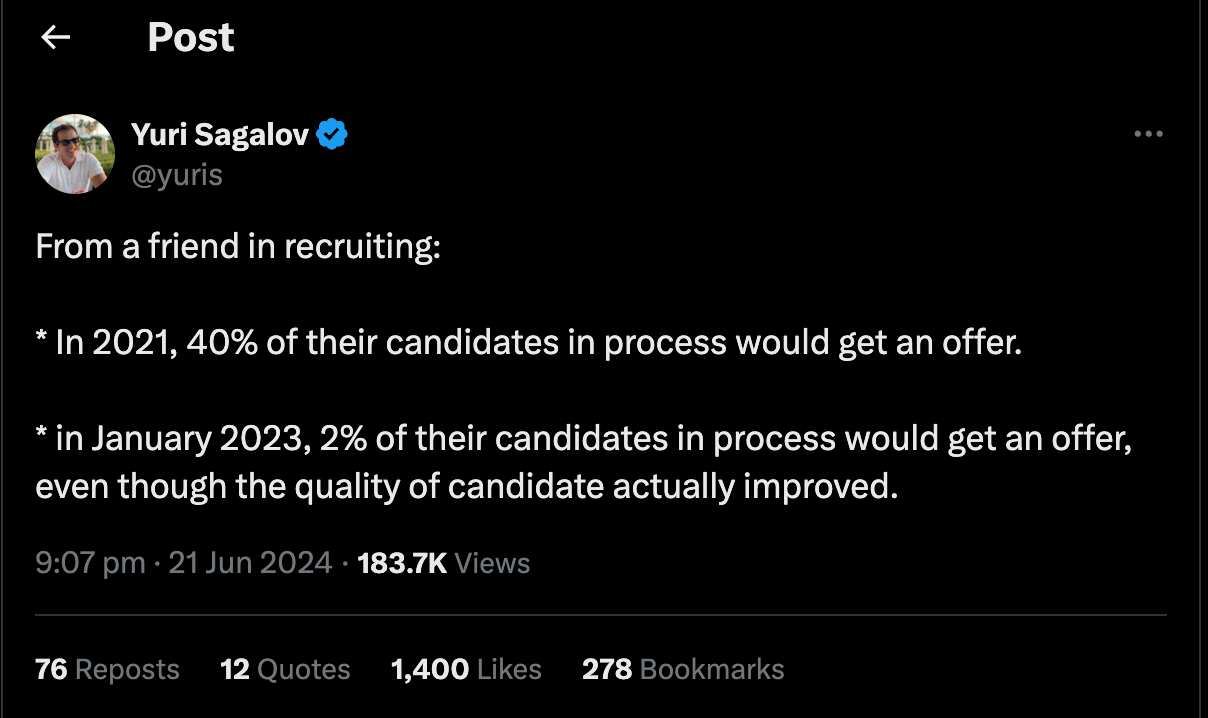In today's competitive job market, landing a job has become more difficult than ever.
A recent tweet by Yuri Sagalov in the tech industry, highlights this sad reality.
In 2021, 40% of candidates in process would get an offer.
However, by January 2023, this number had dropped to just 2%, despite an improvement in candidate quality.
Here's How to Stand Out Despite These Challenges
1. Target the Right Role:
Focus your efforts on roles that align closely with your skills, experience, and career goals.
By targeting the right roles, you increase your chances of finding a good match and succeeding in the interview process.
At Relentless, we encourage candidates to focus on roles that:
Are high in demand
Are low in supply
They are skilled in
If you’re looking for coaching or access to a dashboard that’ll help you answer questions, book time on our site using the link at the bottom of this article.
2. Apply to 30-50 Posts per Week That Were Posted in the Last 7 Days:
Maximize your chances of landing interviews by applying to a high volume of job postings.
Aim to apply to 30-50 positions per week, focusing on those posted within the last 7 days.
Fresh job postings are less likely to have a large number of applicants, increasing your chances of being noticed.
3. Identify the Right People to Reach Out to in Each Organization and Contact Them:
Networking is a powerful tool in the job search process. Identify key individuals within the organizations you are applying to, such as hiring managers or team leads, and reach out to them directly.
Personalized messages expressing your interest and highlighting your relevant skills can set you apart from other candidates.
If you use Relentless, we’ll do this for you, but if you’re on your own make sure you do it too!
4. Tailored Applications:
Generic applications are less likely to catch the attention of hiring managers.
Tailor your resume and cover letter to each specific job, highlighting relevant experiences and skills.
Demonstrating that you have taken the time to customize your application shows your genuine interest in the role and attention to detail.
5. Persistence and Resilience:
The job search process can be long and discouraging, but persistence is key.
Regularly follow up on applications, seek feedback from interviews, and continuously refine your approach.
Resilience in the face of rejection is essential, as each setback is an opportunity to learn and improve.
Keep pushing forward, and remember that every no brings you closer to a yes.
In summary:
Let's face it - the job market sucks.
More people with better skills are getting fewer offers.
So what does this mean for you?
It means you've got to step up your game.
You need to be smart about which jobs you're going after, how you're applying, and who you're connecting with.
And hey, don't give up.
It might take longer to land that job, but if you stay on top of it and keep pushing, you'll get there.
It's all about having a solid plan and sticking to it.
Yeah, it's harder now, but with the right moves, you can still nail that dream job.




2% seems about right. I think one factor is the sheer number of applications that are reviewed by AI systems and the ease of submitting an application (think Easy Apply). My field (payroll) is needed worldwide, at virtually every business, yet each role on the market has hundreds if not thousands of applicants on a high-cost job boards. Interviews are a lot like a first or second date. If you're already employed, you appear to be a desirable candidate. In-as-much, if you're not single, clearly another person sees value in you as a partner. We all get desperate, and sadly it can hurt our chances at a job or a relationship. I remember finding my longest relationship on match.com when it was one of the first online dating apps and required a paid subscription for even basic functions. In recent years, free apps appeared and the number of "candidates" soared. Many job seekers can't afford to pay to apply to jobs. But if they were willing to pay a finders fee retroactively, much like a recruiter might get paid to place a candidate, perhaps the qualified candidate field would be narrowed down. Perhaps not. Any thoughts?